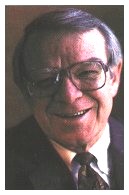
VOL. 9 NO. 2 THE MAGAZINE OF THE UNIVERSITY OF UTAH FALL 1999
AND FINALLY
Over and Out
by Ted Capener
 The
University of Utah should be-and is-a remarkable institution. It has been
an integral part of my life for nearly two decades. I loved my student
years here. And the past l4-plus years as a staff member have been, to
say the least, challenging and highly rewarding.
The
University of Utah should be-and is-a remarkable institution. It has been
an integral part of my life for nearly two decades. I loved my student
years here. And the past l4-plus years as a staff member have been, to
say the least, challenging and highly rewarding.
To be involved with one's "own" magazine, alumni association, radio and TV stations, athletic program, public relations operation, government and community relations endeavors, magnificent garden, academic press, theatres-and more-has been, for me, the "perfect" job.
This is the flagship of Utah's higher education system. Students are not the only ones receiving an education. So, too, are we who labor here. What have I learned?
- This is not a corporation. Although the budget approaches a billion dollars a year, and there are many business principles that can and should be used, what we do is different. For us, the bottom line is "changing lives."
- Those lives are changed in classrooms, laboratories, and in social interaction that occurs in many ways. Young minds (and some not so young) are challenged every day. New (and old) ideas and information are studied and discussed. Students leave better prepared to think and, hopefully, know that lifelong learning is essential in our rapidly changing world.
- Decision-making at a university is often frustratingly slow. But that is most often a good thing. The University is comprised of thousands of people and hundreds of programs. It does not belong to any one person, one political party, one set of administrators, one professor or dean, one graduating class, or any single donor. The U belongs to all of us and many more. Thus, change in our business appropriately requires widespread consultation and input.
- In one way or another, everything done here is aimed at supporting and enhancing academic excellence. Those who support our athletic programs, listen to our radio station or watch our TV station, visit Red Butte Garden, or read this magazine come to love and more strongly bond with the institution. Many contribute money or time. Others may provide legislative support. Some offer all of the above. Such support has resulted in a level of excellence that continues to surpass the vision of our founder, Brigham Young, and the many other leaders who have followed.
Much has changed since I obtained my bachelor's degree some 46 years ago. Enrollment has nearly tripled, as have the number of courses offered. Parking has obviously become an even bigger problem. (We badly need east-west light rail and more car pooling.) There are many more buildings on campus. (But the annex—where journalism students and others spent many long days—remains, and continues to be fully occupied.)
Ours is still a "commuter campus," but the number of students living on campus, experiencing a full university life, will hopefully increase with construction of new student housing that will also be used as the Olympic athletes' village.
Opportunities for out-of-classroom activities are increasing. The Bennion Center provides hundreds of students a chance for meaningful community service. The newly organized student presenter's office is bringing entertainment and educational programming to campus. Pioneer Theatre Company offers students ongoing opportunities to see the best possible stage productions at little cost. And the newly renovated Kingsbury Hall (yes, it is now air conditioned) is the new home for student operas and ballet department performances, as well as a variety of other theatrical engagements by national touring companies and for noted speakers, and a venue for Homecoming activities and commencement exercises.
Opportunities now exist that did not during my halcyon student days. So, too, do new challenges. Entrance requirements and classroom competition are tougher. As the University has become recognized as one of the nation's major research institutions, an often heated debate has arisen regarding teaching vs. research. Has teaching suffered because many professors spend a majority of their time doing research rather than teaching? Academic leaders here have seriously looked at this question. Where imbalance has occurred, efforts are being made to pull the pendulum back into balance. In many disciplines, teaching and learning are greatly enhanced by opportunities for students to work closely with some of the world's best research professors. But more needs to be done to recognize classroom performance when annual reviews consider retention, promotion, and tenure.
During my 27 years in commercial broadcast news, I always felt my U of U training served me extremely well. During my nearly 10 years as a Washington, D.C., correspondent, I competed with journalists who graduated from some of the nation's elite schools of journalism. I found great comfort in knowing my college education and training served me very well.
And so I leave knowing that alumni and friends of the U will continue to appreciate and support the magnificent contribution this great institution makes to the people of our state and, yes, to the nation as a whole. Indeed, I am proud to be a Utah man and will be 'til I die.
Copyright 1999 by The University of Utah Alumni Association